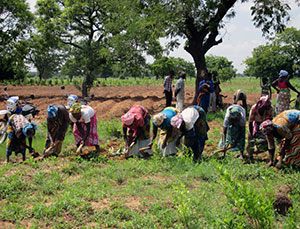
SPRING/Ghana developed this farmer field school (FFS) curriculum to improve farming practices and increase aflatoxin-safe groundnut crops for better household nutrition. It was originally developed for the Ghana Ministry of Food and Agriculture’s agricultural extension agents to work with groundnut farmers in Northern Ghana supported by SPRING. We trained agents to use the curriculum before they began facilitating their sessions with local farmers. While the content of the curriculum was designed to train farmers in the Northern and Upper East Regions where SPRING has been operating, it can be used for groundnut farmers throughout Ghana.
This curriculum was designed to fit the FFS training model, in which sessions are conducted “on the farm,” following an experiential learning model in an environment that allows for demonstration, practice, and application of the material on the farmers’ own groundnut plots. Each session outlined in the curriculum includes a variety of activities to accomplish the session’s objectives, along with detailed instructions for trainers.
The majority of groundnut farmers in SPRING’s farmer field schools are women living in 1,000-day households – those that include pregnant or lactating women or children under the age of two. By engaging farmers with using optimal agricultural practices, the curriculum seeks to improve these households' nutrition outcomes.
Much of the curriculum focuses on the reduction of aflatoxin contamination in groundnuts and other staple crops in northern Ghana. Aflatoxins are toxic compounds produced by certain moulds, and they are common contaminants in groundnuts. Exposure to aflatoxins can cause serious health problems, such as cancer, stunting, and anaemia. The SPRING team is focused on promoting good agronomic practices to reduce aflatoxin contamination in groundnuts as a way of improving the overall health of Ghanaian farmers and their families. Further, the curriculum integrates messages about water, sanitation, and hygiene, as well as nutrition, which are important for 1,000-day households.
When planning and facilitating the training sessions with the farmer groups, Ministry of Food and Agriculture trainers using these materials are encouraged to use SPRING’s Aflatoxin Photo-Aid and Aflatoxin Awareness Drama alongside this curriculum. Trainers are also encouraged to collaborate with environmental health officers, community development officers, community health nurses, and nutrition officers when facilitating sessions that draw on their expertise regarding hygiene and early childhood nutrition.
To view the full curriculum, please use the download link above.